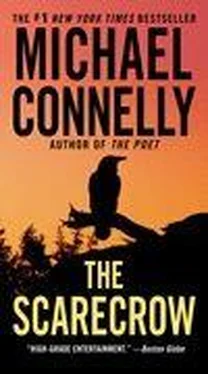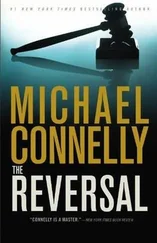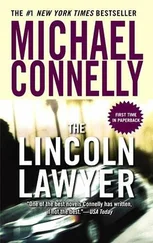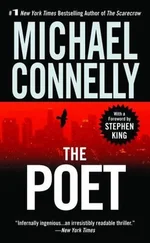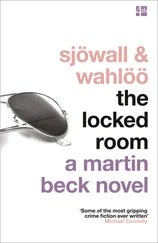“By ‘UC,’ you mean undercover?”
“Yes, undercover.”
“What was the name, do you remember?”
“Ronald Weldon.”
I knew this could be checked with Hensley and hotel records if I needed to corroborate Lankford’s story later. The case had suddenly changed dimensions with Lankford’s testimony.
“Okay, what happened next?”
“Marco got the room and gave me the key. It was on the eighth floor. I went there, and when I was opening the door, one of the bellmen arrived with a cart to the room across the hall.”
“You mean it looked like the people in that room were checking out?”
“Yes.”
“What did you do next?”
“I went into my room and watched through the peephole. There was a couple in the room opposite mine. The bellman left with their luggage first and then they left. They didn’t pull the door closed all the way. So I went across and into the room.”
“What did you do in there?”
“I looked around first. And I got lucky. In the trash can, there were several envelopes, and it looked like wedding cards had come in them. They were addressed to Daniel and Linda or Mr. and Mrs. Price and things like that. I figured out that his name was Daniel Price. So I used that name and that room number to set up Giselle Dallinger to come that night.”
“Why did you go through such elaborate efforts?”
“Because first of all, I know everything can be traced. Everything. I didn’t want this coming back on me. And second, I worked vice when I was a cop. I know how prostitutes and pimps work it to avoid law enforcement. Whoever the setup person was for Giselle would call me back at the hotel. It was their way of hopefully confirming I wasn’t law enforcement. I could’ve done it from the room Marco got me, but I saw that open door and thought it would be better and completely untraceable to me. And Marco.”
With his answer Lankford walked across the line from plausible deniability to conspiracy to commit. If he had been my client, I would have stopped him by now. But I had my own client to clear. I pressed on.
“Are you saying that you knew what was going to happen to Giselle that night?”
“No, never. I was just taking precautions.”
I studied Lankford, unsure if he was elaborately covering his own culpability in a murder or actually telling the truth.
“So you set up the liaison for that night and then you waited for her in the lobby, correct?”
“Yes.”
“Using your hat as a shield against the cameras?”
“Yes.”
“And then you followed her home to Franklin Avenue.”
“I did.”
The judge interrupted at that moment and addressed the jury.
“Ladies and gentlemen, I know it seems as though we just got started but we are going to take a quick five-minute break. I want you to go to the jury room and stay close by. I want all counsel and the witness to remain in place, please.”
We stood as the jury filed out. I knew what was coming. The judge couldn’t just sit there without warning Lankford of his peril. As soon as the jury room’s door closed, she turned to my witness.
“Mr. Lankford, do you have counsel present?”
“No, I don’t,” Lankford responded calmly.
“Do you want me to pause your testimony here so you can seek the advice of counsel?”
“No, Your Honor. I want to do this. I’ve committed no crime.”
“You are sure?”
The question could be taken two ways. Was Lankford sure he didn’t want a lawyer, or was he sure he had committed no crime.
“I would like to continue to testify.”
The judge stared at Lankford for a long moment as if taking some sort of measure of him. She then turned away and signaled for the courtroom deputy to approach the bench. She whispered to the deputy and then he immediately walked to the side of the witness stand and took a position next to Lankford. He put his hand on his sidearm. It looked as if he was about to make an arrest.
“Mr. Lankford, will you please stand.”
Looking puzzled, Lankford stood. He glanced at the deputy and then at the judge.
“Are you wearing a firearm, Mr. Lankford?” Leggoe asked.
“Uh, yes, I am.”
“I want you to surrender your weapon to Deputy Hernandez. He will secure it until your testimony is completed.”
Lankford didn’t move. It became clear that Leggoe was concerned that he was armed and might attempt to harm himself or others. It was a good move.
“Mr. Lankford,” the judge said sternly. “Please hand your weapon to Deputy Hernandez.”
Hernandez responded by unsnapping his holster with one hand and keying his shoulder mike with the other. I assumed he was broadcasting an emergency code of some sort to others in courthouse security.
Lankford finally raised his hand and reached inside his sport coat. He slowly removed his gun and handed it to Deputy Hernandez.
“Thank you, Mr. Lankford,” the judge said. “You may sit down now.”
“I have a pocket knife, too,” Lankford said. “Is that a problem?”
“No, Mr. Lankford, that is not a problem. Please be seated.”
There was a collective exhale of relief in the courtroom as Lankford sat down and Hernandez took the gun to his desk to lock it in a drawer. Four deputies flooded into the courtroom through the rear door and the holding area entrance. The judge immediately told them to stand down and called for the jury to be returned to the box.
Three minutes later, things seemed to have returned to normal. The jury and witness were in place and the judge nodded at me.
“Mr. Haller, you may proceed.”
I thanked the judge and then tried to pick up at the point where I had been interrupted.
“Investigator Lankford, did you tell Agent Marco to meet you there at the Franklin address?”
“No, I called him and gave him the address. Shortly after that I left. I was done. I went home.”
“And two hours later, Gloria Dayton, the woman using the name Giselle Dallinger, was dead. Isn’t that right?”
Lankford cast his eyes down and nodded his head.
“Yes.”
I once again checked the jury and saw that nothing had changed. They were mesmerized by Lankford’s confession.
“I’ll ask you again, Investigator. Did you know she would die that night?”
“No, I did not. If I had…”
“What?”
“Nothing. I don’t know what I would have done.”
“What did you think would happen once you gave Gloria Dayton’s address to Marco?”
Forsythe objected, saying the question asked for speculation, but the judge overruled it and told Lankford he could answer. Like everyone else in the courtroom, Leggoe wanted to hear the answer.
Lankford shook his head.
“I don’t know,” he answered. “Before I gave him the address that night, I asked him again what was going on. I said I didn’t want to get involved if she was going to get hurt. He insisted that he just wanted to talk to her. He admitted that he knew she was back in town because she had called him from a blocked number and told him that she’d gotten a subpoena in some civil case. And he said he needed to find her to talk to her about it.”
I underlined that answer with some silence. Essentially my case was made. But it was hard to end Lankford’s testimony.
“Why did you do this for Agent Marco?”
“Because he had a hold on me. He owned me.”
“How?”
“Ten years ago I worked that double-homicide case in Glendale. On Salem Street. I met him on that and I made a mistake…”
Lankford’s voice trembled slightly. I waited. He composed himself and continued.
“He came to me. He said there were people…people who would pay for the case to remain unsolved. You know, pay me not to solve it. The truth was, my partner and I probably weren’t going to close it. Not a shred of evidence was left in that place. It was an execution and the hitters had probably come across the border and then gone right back. So I thought, what difference would it make? I needed the money. I had gotten divorced and my wife—my ex-wife—was going to take our son away. She was going to move to Arizona and take him, and I needed money for a good lawyer who would fight it. My boy was only nine. He needed me. So I took the money. Twenty-five thousand. Marco made the deal and I got the money and after that…”
Читать дальше
